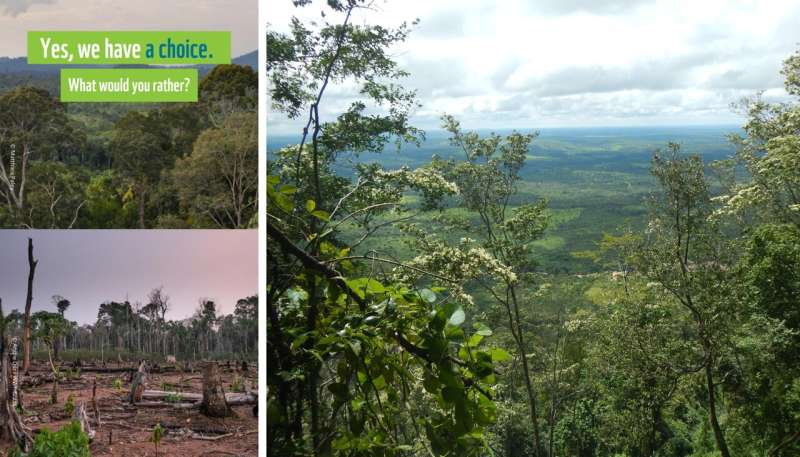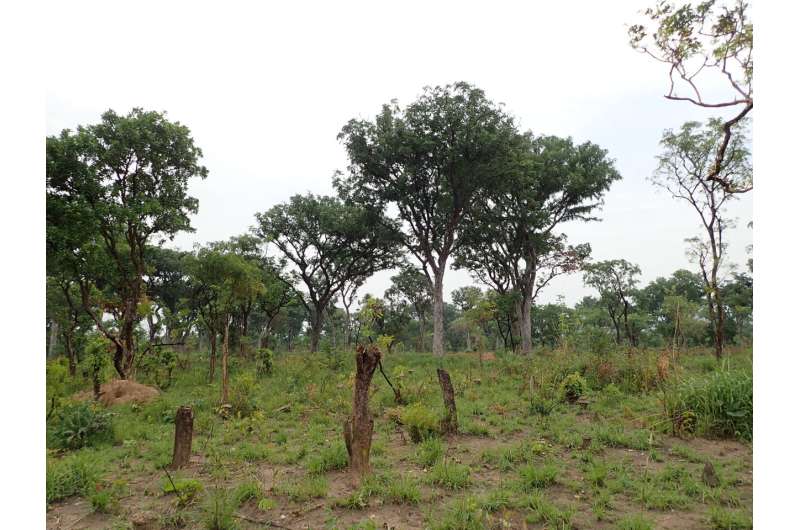Tropics in crisis: Scientists call for preservation of Guinea's indigenous plants in WWF Living Planet Report 2022

In a report published today by World Wide Fund for Nature (WWF), scientists from the Royal Botanic Gardens, Kew and National Herbarium of Guinea-UGANC highlight initiatives to protect biodiversity and support the well-being of local communities in west Africa, including countries such as the Republic of Guinea.
According to the latest and biggest dataset published in the WWF's Living Planet Report 2022, monitored populations of wildlife—mammals, birds, reptiles, amphibians, and fish—have fallen by 69% since 1970, based on an analysis of almost 32,000 species populations. Further adding to this bleak picture of the planet's health, RBG Kew's State of the World's Plants and Fungi 2020 report estimates that 2 in 5 plants globally are threatened with extinction.
WWF, RBG Kew, and partners are now calling on governments, businesses, and the public to take a stand against the ongoing biodiversity crisis. Among the biggest threats to nature today are land-use change, the destruction of habitats, and the over-exploitation of plants and animals. However, scientists warn climate change could become an even greater driver of biodiversity loss in the coming years if global warming is not limited to 1.5C.
Marco Lambertini, Director General of WWF International, says that "we face the double emergencies of human-induced climate change and biodiversity loss, threatening the well-being of current and future generations. WWF is extremely worried by this new data showing a devastating fall in wildlife populations, in particular, in tropical regions that are home to some of the most biodiverse landscapes in the world."

The tropics are among the most biodiverse places on the planet, home to an incredible variety of animals, plants, and fungi. Plants, however, are often underrepresented in global conservation efforts, highlighting the need to unlock the data on their diversity and distribution for better-informed conservation policy. Aiding this effort is the Tropical Important Plant Areas (TIPAs) program, launched at RBG Kew in partnership with Plantlife International, through which Kew scientists and partners are together, country by country, working to designate the areas with irreplaceable plant diversity in terms of threatened species, including those with socio-economic importance, as well as threatened habitats.
Such programs are crucial not only for the protection of nature, but they can also support the propagation and planting of "useful" indigenous plant species that improve the cultural and economic well-being of local communities. In Guinea, for example, the fruits and nuts of many trees have been traditionally harvested from wild forests. Unfortunately, rampant deforestation has cleared 96% of Guinea's original forest by the 1990s.
Denise Molmou, National Herbarium Guinea and lead author of a section of the LPR, says that "Guinea is a country endowed with significant biological diversity. This diversity is being irrationally exploited and degraded at a considerable rate by human activities. In 2021, 167kHa of tree cover loss was recorded by Global Forest Watch."
"The main causes of this destruction are bush fires, slash and burn agriculture, charcoal, logging, mining, and urbanisations all underlined by the increased population pressures on the resources. The diversity of the forest plays multiple roles in the socio-economic life of the Guinean population. They occupy a vital place in most aspects of the daily life of the population by providing them with food, fiber, medicine, fuel, shelter, clothing, and even the air we breathe."
Scientists now warn the demand for edible nuts such as tola (Beilschmiedia mannii), petit kola (Garcinia kola) and the gingerbread plum bansouma (Neocarya macrophylla) is exceeding the available supply. This is a worrying development as these nuts are a vital and much appreciated source of nutrition that could support human health.
Initiatives are now underway in Guinea to introduce these species alongside Critically Endangered trees in the buffer zones of three designated Tropical Important Plant Areas (TIPAs). Scientists believe this approach offers an incentive for local communities to conserve nature, while providing better access to nutrition and the economic benefits from their harvest. Protecting the well-being of local communities in Guinea is a vital aspect of RBG Kew's conservation work as the country is ranked among the lowest in the Human Development Index.
Charlotte Couch, Project Officer: Tropical Important Plant Areas (TIPAs) of Guinea at Kew, says that "over 60% of Guinea's population lives in rural areas and relies on natural products for foods and medicines. They are sold in the markets of regional towns and there is a high demand for them. The government and private sector need to promote the planting of these non-timber forest products and other native species in their reforestation programs to invest in people so that they can improve their livelihoods as custodians of these species."
Martin Cheek, Senior Research Leader on the Africa team at Kew, adds that "we need to take action on the ground now to support local communities around TIPAs to protect natural habitat using it sustainably, otherwise they have no option but to continue to degrade and clear it."
More information: Report: livingplanet.panda.org/en-us/
Provided by Royal Botanic Gardens, Kew

















